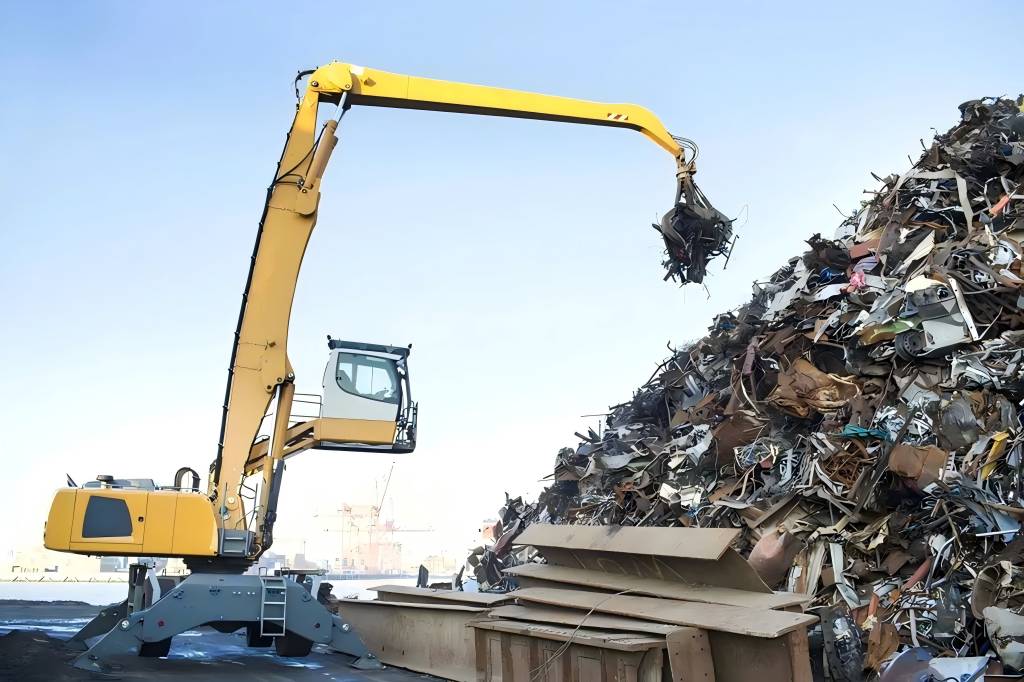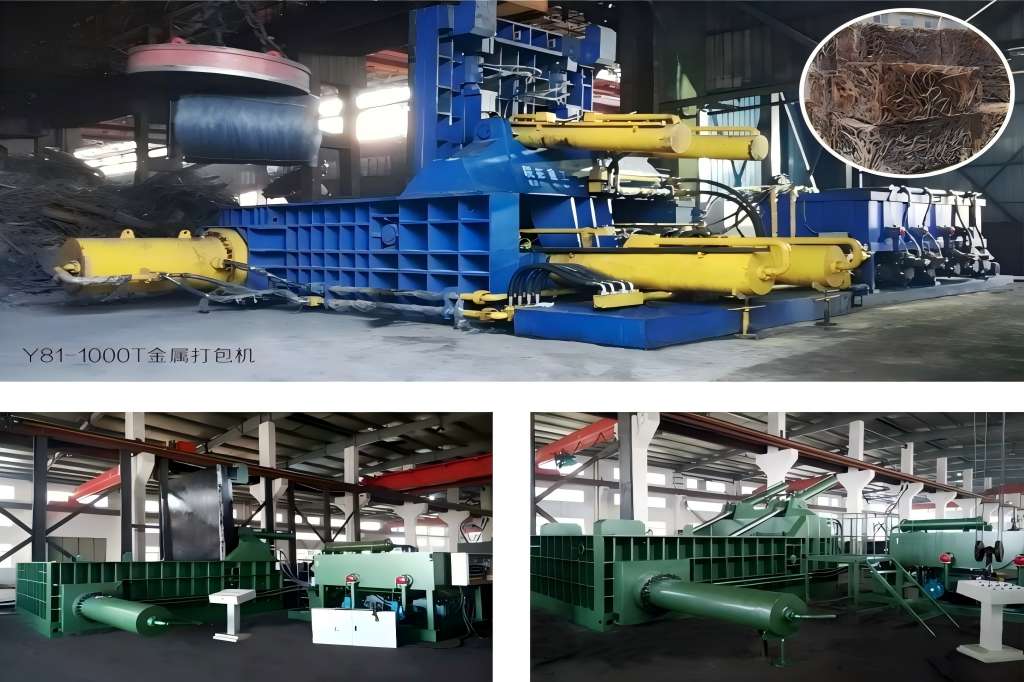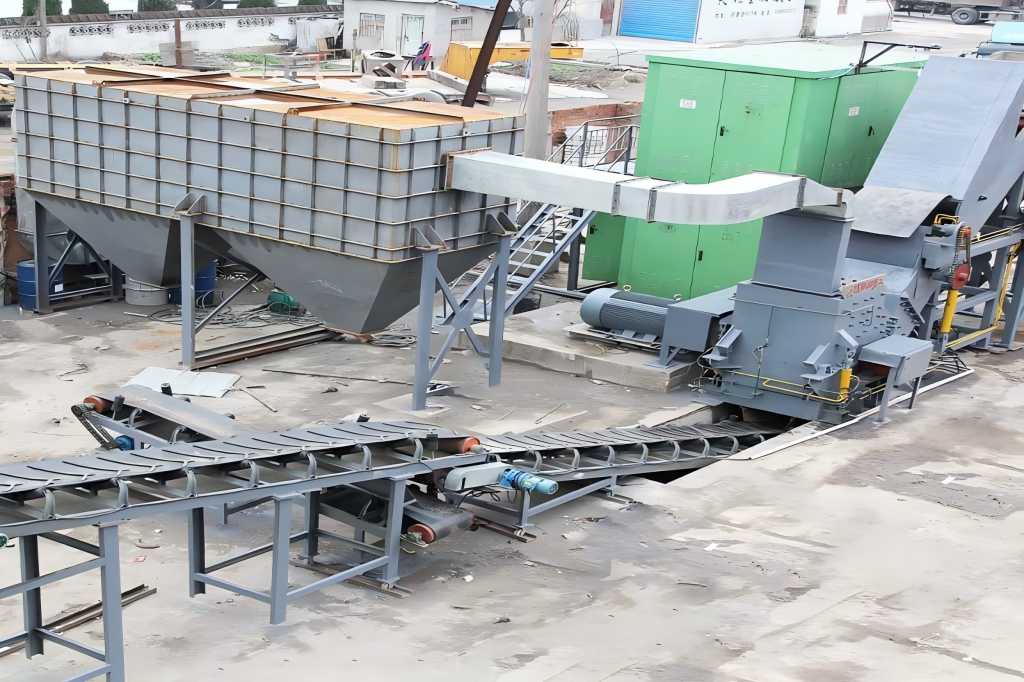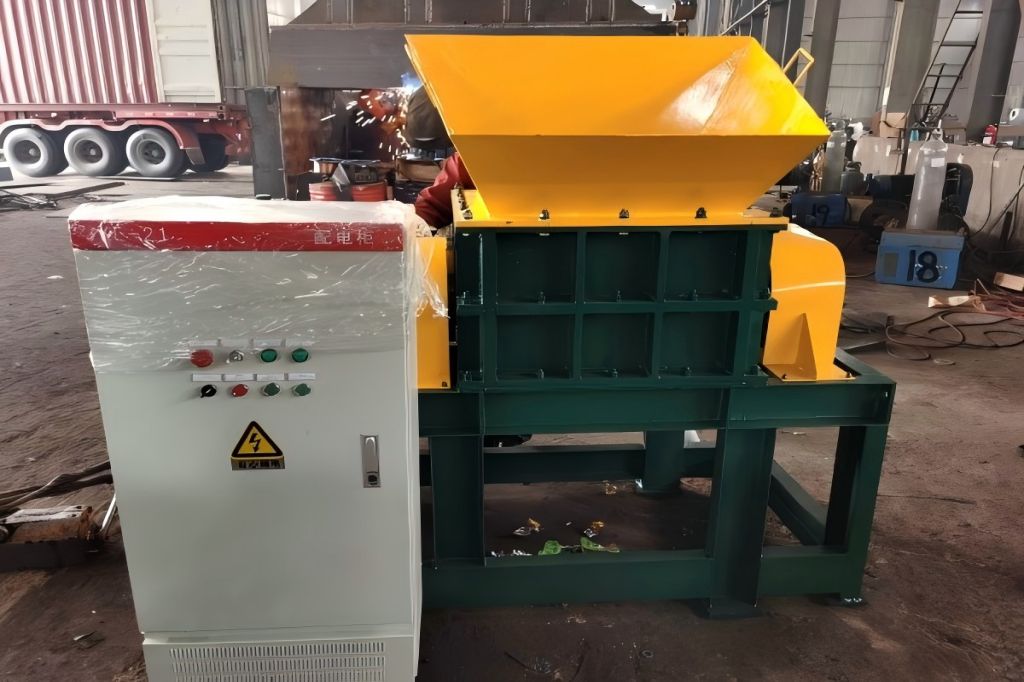Scrap metal recycling is a booming global industry offering opportunities for innovation, economic growth, and environmental conservation. This business appeals to entrepreneurs by offering a profitable venture that aligns with sustainable practices, promotes the circular economy, decreases dependence on virgin resources, and generates employment opportunities.
This guide covers essential insights—from market analysis to advanced technologies—to help you thrive in this dynamic sector.
1. Unlocking the Potential of Recycling Scrap Metal
Scrap metal recycling has gained prominence as a pivotal industry, addressing both economic and environmental concerns.
The Industry at a Glance
Over the next ten years, the worldwide scrap metal market is expected to increase significantly, with a 2023 valuation of over $200 billion.
Metals like steel, copper, aluminum, and brass dominate the recycling industry, thanks to their ability to retain quality through multiple recycling cycles.
The rise of industrialization in emerging markets, coupled with stringent environmental regulations in developed nations, has created a robust demand for recycled materials.
Key Drivers and Benefits
- Cost-effectiveness: Recycling metal uses a lot less energy than extracting and processing new materials, up to 95% less for aluminum.
- Environmental Impact: Recycling decreases greenhouse gas emissions, safeguards natural resources, and lessens the reliance on landfill disposal.
- Global Supply Chain Stability: As the world faces resource shortages, recycled metals are becoming essential to meet demand in the construction, automotive, and electronics industries.
Opportunities for Entrepreneurs
- Local Recycling Centers: Collect and process scrap from residential and industrial sources.
- Recycling E-Waste: Extract precious metals from discarded electronics, including palladium, silver, and gold.
- Specialized Markets: Focus on high-value niches, such as aerospace alloys or rare earth metals used in renewable energy systems.
2. Establishing a Scrap Metal Recycling Business
Starting a scrap metal recycling business requires a well-thought-out strategy that aligns with market demands, operational goals, and regulatory requirements. The foundation for a successful endeavor in this cutthroat and dynamic market is laid by careful preparation and execution.
Comprehensive Market Research
The first step in establishing your business is conducting a detailed market analysis:
- Demand and Supply Analysis: Identify the most commonly recycled metals in your region, such as steel, copper, and aluminum, and gauge their demand.
- Competitor Study: Assess the strengths and weaknesses of local competitors, including their pricing models, service offerings, and client base.
- Customer Segmentation: Understand potential clients, from construction companies to electronics manufacturers, and tailor services to their needs.
Developing a Business Strategy
A solid business plan serves as your operations’ road map:
- Establish your company’s goals, including your target market share, income, and expansion strategies.
- Outline initial investment requirements, including equipment costs, employee salaries, and facility expenses.
- Include projected revenue streams, such as selling processed metals or partnering with industries for waste management.
Observance and Permits
Following local laws is essential to avoiding legal issues. The specific permits and regulations required for a scrap metal recycling business vary widely depending on your location. Below is an example of compliance requirements for different regions, illustrating the importance of adhering to federal, state, and local guidelines:
United States:
California
- Department of Toxic Substances Control (DTSC): Scrap metal recyclers must adhere to hazardous waste management regulations, which include obtaining permits for handling and processing materials.
- CalRecycle: Operators may require solid waste facility permits and guidance on waste diversion goals.
- Local Enforcement Agencies (LEAs): These agencies ensure compliance with local zoning, stormwater permits, and air quality regulations.
Texas
- Texas Metals Program (DPS): MREs are required to register with the DPS and adhere to the Texas Online Metals (TOM) reporting system.
- Texas Commission on Environmental Quality (TCEQ): Facilities need to notify TCEQ of their recycling operations and comply with environmental regulations, such as submitting a Notice of Intent (NOI).
- Local Permits: Cities like Houston may require separate operating licenses and adherence to local ordinances.
New York
- Department of Environmental Conservation (DEC): Recycling facilities must adhere to environmental conservation laws and obtain solid waste management facility permits.
- Local Authorities: Cities like New York City have additional zoning laws and noise ordinances for recyclers.
United Kingdom:
- Environmental Agency (EA): Operators must apply for a waste management license to handle scrap metal.
- Scrap Metal Dealers Act: Businesses must register with local councils and comply with regulations for handling, storing, and transporting scrap materials.
- Environmental Permits: Recyclers may need to comply with additional water discharge and emissions regulations.
Australia:
- Environmental Protection Authorities (EPA): Each state has specific regulations. For example:
- Victoria: Requires a Waste Transport Certificate for transporting scrap metal.
- New South Wales: Facilities must adhere to pollution prevention standards and apply for an Environmental Protection License (EPL).
- Local Councils: Approvals for site use, including zoning permits and environmental impact assessments.
India:
- Central Pollution Control Board (CPCB): Recycling operators are required to follow hazardous waste management guidelines and register with the CPCB or State Pollution Control Boards (SPCBs).
- E-Waste Management Rules: E-waste recyclers must register and comply with extended producer responsibility (EPR) laws.
- Municipal Permits: For the transportation of garbage and land use, local governments may need licenses.
Location Selection
Choosing the right location can influence your business’s efficiency:
- Opt for industrial areas near suppliers and buyers.
- Ensure the site has adequate space for sorting, storage, and processing operations.
- Verify accessibility to transportation networks, such as highways and railroads.
3. Equipping Your Business with Technology and Tools
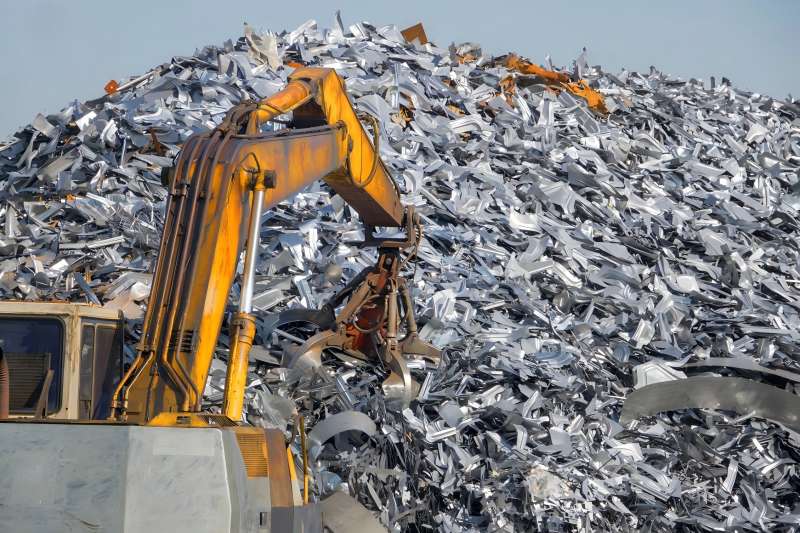
The efficiency and profitability of a scrap metal recycling business heavily rely on the technology and tools used.In addition to improving operations, investing in cutting-edge equipment reduces waste and increases profits.
Essential Tools and Equipment
- Collection Vehicles: Trucks equipped with hydraulic lifts and cranes for hauling heavy scrap metal.
- Magnetic Separators: Designed to differentiate ferrous metals from non-ferrous ones during the sorting process.
- Shredders and Crushers: Machines that break down large pieces of scrap into manageable sizes for further processing.
- Baling Machines: Compress scrap metal into dense, transportable bales to optimize storage and logistics.
- Shears and Cutting Tools: Hydraulic or plasma cutters for dismantling large machinery and structures.
Integrating Advanced Technology
Modern technology can revolutionize your operations:
- AI and Machine Learning: Use AI-driven systems to automate sorting, improving speed and accuracy.
- IoT Monitoring: Implement sensors to monitor equipment performance, reducing downtime and maintenance costs.
- Automation: Invest in robotic arms and conveyor systems to streamline material movement and sorting.
Sustainable Energy Solutions
Incorporate renewable energy sources to power your facility:
- Electricity expenses can be reduced by installing wind turbines or solar panels.
- Energy-efficient machinery reduces overall energy consumption and operational expenses.
4. Building a Reliable Supply Chain
A strong supply chain is the foundation of a profitable recycling company because it guarantees a consistent flow of raw materials and prompt delivery of processed metals.
Establishing Relationships with Suppliers
Collaborating with Construction Companies
Why Construction Companies?
Construction projects generate significant quantities of scrap metal, including steel beams, pipes, wiring, and aluminum siding. These companies are reliable partners for a steady supply of recyclable materials.
How to Collaborate:
Offer Scrap Collection Services:
- Provide on-site bins for construction sites to make scrap collection convenient.
- Set up a schedule for regular pickups based on the project timeline.
Negotiate Contracts:
- Establish long-term agreements with construction firms to ensure a consistent supply of scrap metal.
- Provide incentives for large purchases and competitive pricing based on market rates.
Promote Sustainability:
- Highlight the environmental benefits of recycling their scrap materials.
- Provide reports or certificates showing how much material was recycled, which construction firms can use to meet green building certification requirements (e.g., LEED).
Engage Early in the Project Cycle:
- Collaborate with contractors during the planning stages to integrate recycling into the project workflow.
- Train workers on proper segregation of recyclable materials to reduce contamination and increase efficiency.
Collaborating with Demolition Contractors
Why Demolition Contractors?
Demolition projects are among the largest sources of scrap metal, including structural steel, copper wiring, plumbing, and HVAC systems. These materials are often high in value and volume, making contractors an essential part of your supply chain.
How to Collaborate:
Provide Specialized Services:
- Offer dismantling and sorting services to assist contractors in safely separating metals from other construction debris.
- Supply portable magnetic separators and baling machines for on-site sorting.
Develop a Buy-Back Program:
- Set up a buy-back arrangement where contractors can sell scrap materials directly to your facility.
- Ensure prompt payment to foster trust and loyalty.
Assist with Compliance:
- Give contractors advice on appropriate recycling and trash disposal procedures to help them comply with environmental standards.
- Offer documentation of recycling efforts for regulatory or client reporting purposes.
Build Relationships with Key Players:
- Find the biggest demolition contractors in your area, then go to industry gatherings to make contacts.
- Offer value-added services, such as detailed recycling reports, to differentiate yourself from competitors.
Collaborating with Manufacturing Plants
Why Manufacturing Plants?
Manufacturing plants often generate large quantities of scrap metal as a byproduct of production processes. This includes cuttings, shavings, defective parts, and end-of-life equipment.
How to Collaborate:
Understand Their Waste Stream:
- Conduct a site visit to analyze their scrap metal generation process.
- Offer customized solutions, such as tailored bins or compactors, to streamline collection and storage.
Provide Regular Collection Services:
- Set up a collection schedule based on the plant’s production cycle.
- Use GPS-tracked vehicles and route optimization software to ensure timely pickups.
Offer Competitive Pricing and Transparency:
- Offer volume discounts for bigger purchases and transparent pricing based on market prices.
- Use digital platforms or portals where manufacturing plants can track the value and volume of their scrap sales.
Develop Recycling Partnerships:
- Propose a recycling partnership where your facility processes their scrap and supplies recycled materials back to them at a discounted rate.
- Highlight how this closed-loop system reduces costs and enhances sustainability.
Compliance and Reporting:
- Help manufacturing plants meet waste management regulations by providing detailed recycling reports.
- Collaborate with their environmental compliance teams to guarantee accurate documentation and compliance with regional regulations.
Optimizing Logistics
Efficient logistics can reduce costs and improve operations:
- Reduce delivery delays and fuel usage by using route optimization software.
- Maintain a fleet of trucks for reliable collection and transportation.
- Partner with logistics providers if setting up an in-house fleet isn’t feasible.
Creating Trust with Stakeholders
- Offer competitive pricing for scrap materials.
- Ensure prompt payment to suppliers to build long-term relationships.
- Provide clear communication about quality standards and expectations.
5. Mastering the Processing of Scrap Metal
Processing scrap metal is a multi-step operation that converts waste materials into high-quality reusable metals. The total profitability and reputation of your company are determined by your level of efficiency and accuracy at this point.
Key Steps in Metal Processing
Sorting and Classification:
- Separate ferrous and non-ferrous metals using magnets.
- Advanced systems like X-ray fluorescence (XRF) machines help identify metal types and compositions.
Cleaning:
- Remove impurities like paint, grease, or coatings to prepare metals for melting.
- Employ chemical or mechanical cleaning methods depending on the type of metal.
Shredding and Crushing:
- Break down large objects like vehicles, appliances, or machinery into smaller pieces for easy handling.
- Shredding also ensures uniformity, which is essential for further processing.
Melting and Refining:
- Melt metals in specialized furnaces are designed for specific materials, such as electric arc furnaces for steel or induction furnaces for aluminum.
- Use refining techniques to eliminate contaminants and achieve industry-standard purity levels.
Quality Control:
Quality assurance is critical to maintaining your reputation:
- Implement testing at various stages to ensure product consistency.
- Provide certifications that meet industry standards, increasing your appeal to buyers.
6. Selling Recycled Metals and Expanding Market Reach
Selling processed metals effectively requires a strategic approach to marketing and distribution. Expanding your market reach ensures consistent revenue and long-term growth.
Target Industries
Pay attention to sectors that use recycled metals extensively:
- Construction: A lot of infrastructure projects involve steel and aluminum.
- Automotive: Copper and steel are integral to vehicle manufacturing.
- Electronics: Recycled rare earth metals cater to the high-tech sector.
Developing a Sales Strategy
- Networking: Build relationships with industrial buyers, brokers, and wholesalers through trade fairs and industry events.
- E-Commerce Platforms: Use online platforms like ScrapMonster or Alibaba to reach international buyers.
- Long-Term Contracts: Offer volume discounts or loyalty programs to secure long-term buyers.
Marketing Techniques
- To draw in eco-aware customers, highlight your dedication to sustainability.
- To increase visibility, make use of digital marketing and social media.
- Create a polished website that includes comprehensive details about your offerings, credentials, and services.
Expanding Globally
Consider entering international markets to diversify revenue streams:
- Research export regulations and duties in target countries.
- Partner with global logistics providers to ensure smooth transportation.
- Highlight your certifications and adherence to global recycling standards to build trust.
7. Tackling Industry Challenges
There are challenges for any company, and the scrap metal recycling sector is no different. By effectively tackling these obstacles, you may set your company apart from the competition and establish it as a market leader.
Price Volatility
Metal prices are highly influenced by global market trends, economic conditions, and geopolitical factors. This volatility can impact profitability.
- Diversification: Process a variety of metals (e.g., steel, copper, aluminum) to mitigate the risk associated with price drops in a single category.
- Hedging Techniques: To lock in prices and lessen exposure to market swings, use financial instruments such as futures contracts.
- Strong Buyer Relationships: Develop long-term contracts with buyers to ensure steady demand and predictable revenue, even during price downturns.
Regulatory Compliance
Environmental laws and safety regulations are continually evolving, and failing to comply can result in fines, legal challenges, or operational shutdowns.
- Keep Up: To stay on top of developments, sign up for alerts from trade associations and regulatory agencies.
- Engage Professionals: To guarantee conformity with national and international regulations, collaborate with compliance officers or environmental specialists.
- Implement Best Practices: Regularly audit your processes to align with standards for waste management, emissions, and workplace safety.
Competition
As the recycling industry grows, competition from both small local players and large multinational corporations intensifies.
- Differentiate Your Services: Offer value-added services like metal certification, fast turnaround times, or eco-friendly processing.
- Focus on Quality: Invest in advanced sorting and refining technologies to deliver high-purity recycled metals that command premium prices.
- Build a Brand: Develop a reputation for reliability, sustainability, and innovation through strategic marketing and exceptional service.
Inefficiencies in Operations
Reduced output, increased expenses, and decreased revenues might result from inefficient procedures.
- Embrace Automation: Use robotic systems and AI-powered sorting tools to enhance productivity and accuracy.
- Employee Training: Regularly train staff to operate equipment efficiently and follow streamlined workflows.
- Continuous Improvement: To find and remove waste in your processes, apply Lean and Six Sigma approaches.
8. Embracing Sustainability and Innovation
Sustainability and innovation are at the core of the scrap metal recycling industry. Businesses that adopt eco-friendly practices and cutting-edge technologies can gain a competitive advantage while contributing to environmental preservation.
Green Business Practices
Sustainability is essential for long-term success; it’s not just a trendy concept.
- Energy Efficiency: Make an investment in energy-efficient machinery, such as solar-powered buildings and electric shredders.
- Zero Waste Policies: Strive to recycle or reuse all byproducts, such as non-metal materials and residue.
- Carbon Footprint Reduction: Use renewable energy sources, optimize logistics routes to minimize emissions, and engage in carbon offset programs.
Innovative Technologies
Innovation drives efficiency, profitability, and competitiveness in the recycling sector.
- Robotics and AI: Automate sorting procedures to increase efficiency, decrease human error, and save labor expenses.
- Advanced Melting Techniques: Use plasma arc or induction furnaces to melt metals with greater energy efficiency and minimal emissions.
- Blockchain Technology: Use blockchain to monitor the quality and origin of recycled metals, guaranteeing supply chains are transparent and trustworthy.
Circular Economy Models
The transition from a linear economy (produce-use-dispose) to a circular economy (produce-use-reuse) is a game-changer for the industry.
- Product Redesign: Work with producers to create more recyclable products.
- Material Recovery Programs: Partner with businesses to reclaim scrap generated during production.
- Public Education: Promote the benefits of recycling to increase scrap availability and community involvement.
Collaboration and R&D
- By funding research and development, companies can keep on top of trends and develop new ideas for the future.
- Collaborate with universities or research institutions to explore new recycling methods, such as recovering rare metals from electronic waste or composite materials.
- Test and adopt emerging technologies, such as laser-induced breakdown spectroscopy (LIBS) for precise material identification.
Final Thoughts
The scrap metal recycling business is a powerful blend of profitability and sustainability. It offers opportunities to reduce environmental impact while generating economic benefits. You may succeed in this expanding market by adhering to industry best practices, welcoming innovation, and cultivating solid connections.

